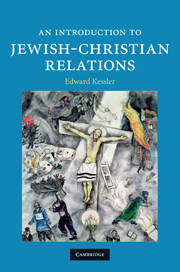Book contents
- Frontmatter
- Contents
- List of illustrations
- Timeline
- Acknowledgements
- List of abbreviations
- 1 Introduction
- 2 The New Testament
- 3 The writings of the church fathers
- 4 The writings of the rabbis
- 5 Biblical interpretation: Another side to the story
- 6 Medieval relations
- 7 Antisemitism and the Holocaust
- 8 Zionism and the state of Israel
- 9 Covenant, mission and dialogue
- 10 Jewish–Christian relations and the wider interfaith encounter
- Further reading
- Glossary
- Index
8 - Zionism and the state of Israel
Published online by Cambridge University Press: 05 June 2012
- Frontmatter
- Contents
- List of illustrations
- Timeline
- Acknowledgements
- List of abbreviations
- 1 Introduction
- 2 The New Testament
- 3 The writings of the church fathers
- 4 The writings of the rabbis
- 5 Biblical interpretation: Another side to the story
- 6 Medieval relations
- 7 Antisemitism and the Holocaust
- 8 Zionism and the state of Israel
- 9 Covenant, mission and dialogue
- 10 Jewish–Christian relations and the wider interfaith encounter
- Further reading
- Glossary
- Index
Summary
Nowhere is the subject of peace and understanding – or, perhaps more realistically, violence and misunderstanding – more evident than in discussions among Christians and Jews about Israel and Palestine, whether they take place in the tea rooms of London and Washington or in the coffee parlours of Jerusalem and Tel Aviv, Ramallah and Bethlehem.
The apparently constant instability in Palestinian-controlled areas and anti-Israel attitudes of varying intensity in Arab countries, combined with the murder of Yitzhak Rabin by an Orthodox Jew in 1995 and threats from some Orthodox and ultra-Orthodox Jews against land for peace initiatives, are reminders of what seems to be an intractable conflict between Israel and the Palestinians. A story is told about an Israeli and a Palestinian leader meeting with God and asking whether there will ever be peace in the Middle East in their lifetime. ‘Of course there will be peace,’ God tells them. They look relieved. ‘However,’ God continues, ‘not in My lifetime.’ More than a century after the beginning of modern Zionism, a peaceful solution seems some distance away.
Yet the political and military conflict does not fully explain why Israel is such a controversial topic in Jewish–Christian relations. Any conversation between Jews and Christians on the significance of the Land and state of Israel brims with emotion and passion. Why?
For Jews, the centrality of the land of the Bible, as well as the survival of over a third of world Jewry, is at stake.
- Type
- Chapter
- Information
- An Introduction to Jewish-Christian Relations , pp. 147 - 169Publisher: Cambridge University PressPrint publication year: 2010



